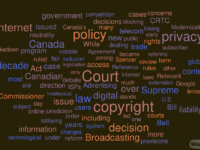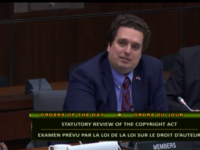
As the decade nears an end, there have been no shortage of decade in review pieces. This post adds to the list with my take on the most notable Canadian digital cases, legislative initiatives, and policies of the past ten years.
1. The 2012 Copyright Modernization Act
The enactment of the 2012 Copyright Modernization Act in June 2012 brought more than a decade of copyright reform battles to a close and immediately ushered in a new round of debate and lobbying that continues until this day. The reform package was the largest copyright overhaul in years, featuring everything from an expansion of fair dealing (including education as a fair dealing purpose) to protection for non-commercial user generated content to the codification of the notice-and-notice system to legal protection for digital locks. The reforms also legalized longstanding practices such as time shifting, set a cap on liability for non-commercial infringement, and established a new provision to target websites that enable infringement.
Read more ›
David Graham was not your typical Member of Parliament. A Liberal MP from the Quebec riding of Laurentides-Labelle, Graham brought a background in open source issues to Parliament Hill. Over his four years as an MP, Graham was seemingly everywhere when it came to digital policy. Whether in the House of Commons talking net neutrality, the Industry committee copyright review or the Ethics committee work on privacy, Graham emerged as the rare MP equally at home in the technology and policy worlds. Graham’s bid for re-election fell short, but this week he joins the Lawbytes podcast to reflect on his experience in Ottawa with thoughts on copyright, privacy, technology policy, and the use of digital tools for advocacy purposes.
Read more ›
David Graham was not your typical Member of Parliament. A Liberal MP from the Quebec riding of Laurentides-Labelle, Graham brought a background in open source issues to Parliament Hill. Over his four years as an MP, Graham was seemingly everywhere when it came to digital policy. Whether in the House of Commons talking net neutrality, the Industry committee copyright review or the Ethics committee work on privacy, Graham emerged as the rare MP equally at home in the technology and policy worlds. Graham’s bid for re-election fell short, but this week he joins the Lawbytes podcast to reflect on his experience in Ottawa with thoughts on copyright, privacy, technology policy, and the use of digital tools for advocacy purposes.
Read more ›
The deadline for submissions to the government’s Broadcasting and Telecommunications Legislative Review Panel passed last week. I posted my submission yesterday, joined by several other organizations representing differing perspectives (CRTC, CBC, Friends of Canadian Broadcasting, Writers Guild of Canada, Internet Society Canada Chapter, CMCRP). However, public availability of submissions will apparently be the exception for the foreseeable future. The panel has rejected an open and transparent policy making process in which public submissions are publicly available, choosing instead to keep the submissions secret for months.
Read more ›
The challenges faced by the Canadian media sector represent an incredibly challenging policy issue for the government. The struggles to adapt to heightened competition in the digital environment – the local paper now competes with a myriad of alternative choices – has led to layoffs, closures, and intense lobbying for a bailout. For the past few years, the government has largely resisted the lobbying efforts, recognizing the risks to the independence and trust in media that can come from government funding for the media itself. While concerns about government influence over the media and journalists are nothing new (I appeared before two Senate committees yesterday which both featured prominent former journalists), there is a difference between the prospect of future appointments and the perception of cash for favourable coverage.
Read more ›










